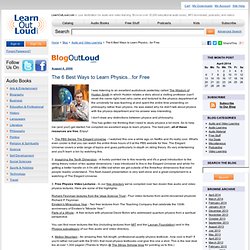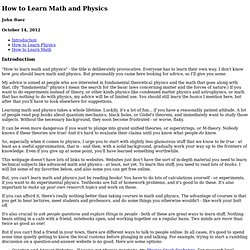

The Elegant Universe: Series ... The Elegant Universe: Part 3 PBS Airdate: November 4, 2003 NARRATOR: Now, on NOVA, take a thrill ride into a world stranger than science fiction, where you play the game by breaking some rules, where a new view of the universe pushes you beyond the limits of your wildest imagination.

This is the world of "string theory," a way of describing every force and all matter from an atom to earth, to the end of the galaxies—from the birth of time to its final tick, in a single theory, a "Theory of Everything. " Our guide to this brave new world is Brian Greene, the bestselling author and physicist. BRIAN GREENE (Columbia University): And no matter how many times I come here, I never seem to get used to it. NARRATOR: Can he help us solve the greatest puzzle of modern physics—that our understanding of the universe is based on two sets of laws that don't agree? NARRATOR: Resolving that contradiction eluded even Einstein, who made it his final quest. S. BRIAN GREENE:The atmosphere was electric. S. The 6 Best Ways to Learn Physics...for Free.
August 6, 2006 I was listening to an excellent audiobook yesterday called The Wisdom of Huston Smith in which Huston relates a story about a visiting professor (can't recall the name right now) who came and lectured to the physics department at the university he was teaching at and spent the entire time presenting on philosophy rather than physics.

He was asked why he didn't talk about physics with the physics department and his answer was interesting. I don't draw any distinctions between physics and philosophy. This has gotten me thinking that I need to study physics a bit more. So to help me (and you!) 1. 2. 3. Richard Feynman lectures from the Vega Science Trust - Four video lectures from world-renowned physicist Richard P. You can find more lectures like this (including lectures from MIT and the Lannan Foundation) and in the Physics subcategory of our free audio and video directory. 4. 5. 6. OK, that should be enough to make your brain hurt for a while. Books. Introduction "How to learn math and physics" - the title is deliberately provocative.

Everyone has to learn their own way. I don't know how you should learn math and physics. But presumably you came here looking for advice, so I'll give you some. My advice is aimed at people who are interested in fundamental theoretical physics and the math that goes along with that. Learning math and physics takes a whole lifetime. It can be even more dangerous if you want to plunge into grand unified theories, or superstrings, or M-theory. So, especially when it comes to physics, I urge you to start with slightly less glamorous stuff that we know to be true - at least as a useful approximation, that is - and then, with a solid background, gradually work your way up to the frontiers of knowledge. This webpage doesn't have lots of links to websites. But, you can't learn math and physics just by reading books! If you can afford it, there's really nothing better than taking courses in math and physics.